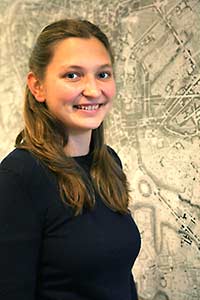Princeton University
Princeton Weekly Bulletin June 4, 2007, Vol. 96, No. 28 prev next current
- Page One
- • Economics major reaches top of senior class, with Ph.D. nearly complete
- • Whittington examines high court justices
- Graduating students
- • Roman decay helps salutatorian to thrive
- • Princeton senior strives to break the cycle of poverty in India
- Inside
- • Programs create opportunities in global health
- • Princeton scientists to study group decision-making by the numbers
- • Rankin uses range of methods to pique interest in German
- Almanac
- • Calendar of events
- • Nassau notes
- • By the numbers
- The Bulletin is published weekly during the academic year, except during University breaks and exam weeks, by the Office of Communications. Second class postage paid at Princeton. Postmaster: Send address changes to Princeton Weekly Bulletin, Office of Communications, Princeton University, 22 Chambers St., Suite 201, Princeton, NJ 08542. Permission is given to adapt, reprint or excerpt material from the Bulletin for use in other media.
- Subscriptions. The Bulletin is distributed free to faculty, staff and students. Others may subscribe to the Bulletin for $30 for the 2006-07 academic year (half price for current Princeton parents and people over 65). Send a check to Office of Communications, Princeton University, 22 Chambers St., Suite 201, Princeton, NJ 08542.
- Deadlines. In general, the copy deadline for each issue is the Friday 10 days in advance of the Monday cover date. The deadline for the Bulletin that covers June 18-Sept. 9 is Friday, June 8. A complete publication schedule is available at www.princeton.edu/ pr/ pwb/ deadlines.html; or by calling (609) 258-3601.
- Editor: Ruth Stevens Calendar editor: Shani Hilton Staff writers: Jennifer Greenstein Altmann, Eric Quiñones Contributing writers: Chad Boutin, Hilary Parker Photographers: Denise Applewhite, John Jameson Design: Maggie Westergaard Web edition: Mahlon Lovett
Roman decay helps salutatorian to thrive
By Jennifer Greenstein Altmann
Princeton NJ — Senior Maya Maskarinec majored in classics, but her Princeton education would have been incomplete without Math 214: “Numbers, Equations and Proofs,” German 306: “Topics in German Intellectual History” and Art 435: “The Arts of Pilgrimage in the Middle Ages.”
“Taking those courses was more than just expanding my knowledge of different fields,” Maskarinec said. “They forced me to think in different ways. They broadened my perspective.”

Salutatorian Maya Maskarinec, in front of a map of Rome during the Middle Ages in the Marquand Library, fell in love with Roman architecture during a semester abroad. Next year she will study the culture of late antiquity and the early Middle Ages at the University of Vienna on a Fulbright grant. (photo: John Jameson)
That perspective — and her passion for the ancient world — led her to write a thesis that brought together architecture, literature and religion in a highly original way. Maskarinec has been selected as the class of 2007’s salutatorian and will continue the Princeton tradition of delivering a speech in Latin at Commencement June 5.
“Maya is exceptional because she works in an interdisciplinary way putting things together,” said Harriet Flower, her thesis adviser. “She came up with something very sophisticated for her thesis, and designed the topic herself from scratch.”
Maskarinec’s thesis examined how Romans in the late fourth century — when Rome was fading from power — regarded their city’s past glory. The topic grew from a semester in Rome during her junior year, when she studied at the Intercollegiate Center for Classical Studies and spent hours walking the streets and exploring the ancient ruins.
“I was captivated by the layers of Rome,” she said. “The ruins are there, layered within the modern city. I became interested in the way people don’t just keep the past, but invent ways to preserve it.”
Exploring the streets of Rome, Maskarinec stumbled on her thesis topic: the Temple of Saturn, built in the late fourth century using marble and other materials that were probably stolen from other buildings. She compared it with a text, Macrobius’ “Saturnalia,” composed entirely of quotations and paraphrases, to discuss how Romans reused their past.
Writing the thesis was a revelation for Maskarinec. “I wouldn’t have thought Roman decay would be fascinating to me,” she said. “But professors in the classics department were willing to show me where I could go with my ideas and to spend time engaging with my ideas.”
Maskarinec grew up in Honolulu, where her German mother spoke to the young girl in her native tongue, giving Maskarinec an early start on learning languages. Reading Homer in high school spurred an interest in Greek.
“It was so beautiful in English,” Maskarinec said, “that I wanted to read it in Greek.”
She studied Latin and Greek on her own with a tutor, since they weren’t offered at her school, and then took a class in Greek at a local university, where her professor encouraged her to apply to Princeton. The University’s academic reputation and generous financial aid package drew her to matriculate. During her Princeton career she was awarded the Shapiro Prize for Academic Excellence in 2005 as well as the 2005-06 Charles Steele Prize in the classics department.
Next year Maskarinec will be studying the culture of late antiquity and the early Middle Ages at the University of Vienna on a Fulbright grant. Eventually she plans to pursue graduate studies in the field of late antiquity.
And someday soon, she would like to spend more time in Rome, wandering the streets and exploring more of the city’s history and architecture.
“People say that a math problem or a literature class makes you think,” she said. “I think walking in a complex city — especially Rome — makes you think.”

